 Petzlover
Petzlover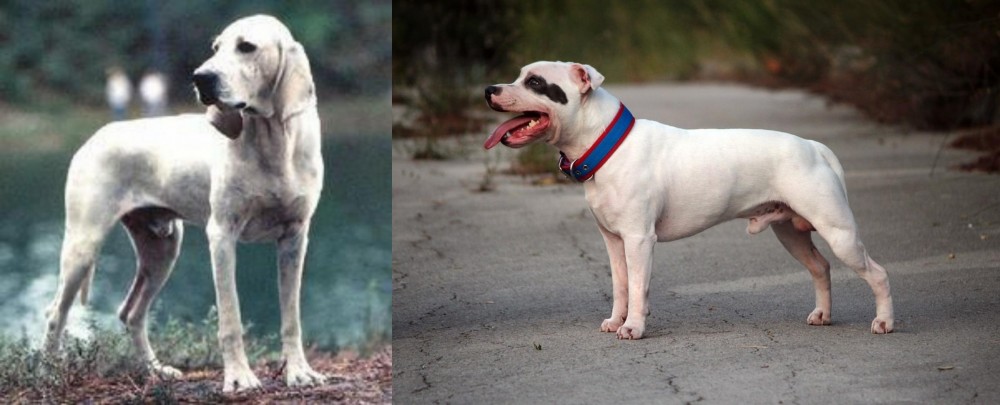 Porcelaine is originated from France but Staffordshire Bull Terrier is originated from United Kingdom. Porcelaine may grow 17 cm / 7 inches higher than Staffordshire Bull Terrier. Porcelaine may weigh 11 kg / 25 pounds more than Staffordshire Bull Terrier. Both Porcelaine and Staffordshire Bull Terrier has almost same life span. Both Porcelaine and Staffordshire Bull Terrier has almost same litter size. Both Porcelaine and Staffordshire Bull Terrier requires Low Maintenance.
Porcelaine is originated from France but Staffordshire Bull Terrier is originated from United Kingdom. Porcelaine may grow 17 cm / 7 inches higher than Staffordshire Bull Terrier. Porcelaine may weigh 11 kg / 25 pounds more than Staffordshire Bull Terrier. Both Porcelaine and Staffordshire Bull Terrier has almost same life span. Both Porcelaine and Staffordshire Bull Terrier has almost same litter size. Both Porcelaine and Staffordshire Bull Terrier requires Low Maintenance.
 The Porcelaine is an attractive dog hailing from France. It is thought to be the oldest of the French scent hounds.
The Porcelaine is an attractive dog hailing from France. It is thought to be the oldest of the French scent hounds.
The dog also goes by the name of Chien de Franche-Comté. The dogs were developed for hunting purposes. It is believed to be an ancient dog breed, dating way back to the 1700s.
It is thought that dogs used to bring about the Porcelain are the Talbot Hound, the English Harrier, the Montaimboeuf, as well as some smaller Laufhunds of Switzerland.
The Club du Porcelaine was established in France in 1971 and the breed was recognized by the FCI in 1975. It is a rare breed virtually unknown outside of France.
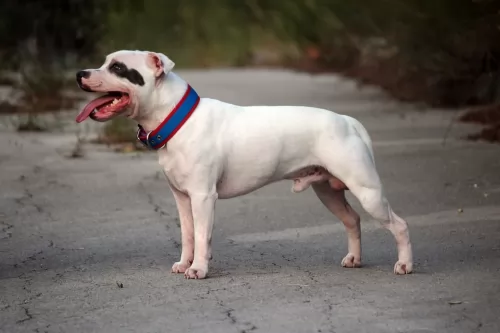 The Staffordshire Bull Terrier was first developed in the northern sections of Birmingham and in Staffordshire, England. The Staffie is a cross between a Black and Tan Terrie and the Bulldog, but had other breeds crossed in over time in order to create a bull-baiting dog and a fighting dog. In the Victorian age these sports were banned but dog fighting went underground and continues on some level today.
The Staffordshire Bull Terrier was first developed in the northern sections of Birmingham and in Staffordshire, England. The Staffie is a cross between a Black and Tan Terrie and the Bulldog, but had other breeds crossed in over time in order to create a bull-baiting dog and a fighting dog. In the Victorian age these sports were banned but dog fighting went underground and continues on some level today.
The Staffordshire Bull Terrier was exceptional at these “sports” due to his build, power and jaw strength. Today’s Staffie is a descendent of those early Bull Terrier crosses. Together with the Bull Terrier and the American Pit Bull, the Staffie also traces its roots back to those original English Bully dogs. All three breeds have the Bulldog in common.
After dog fighting and bull baiting were banned the Stafforshire Bull Terrier was further developed as a companion and pet. Still their reputation as fighting dogs cost them recognition in the official kennel clubs for some time. They finally made the UK registry in 1935, but it was not until 1974 that the American Kennel Club (AKC) accepted them.
 The Porcelaine has got such a gentle, amicable face that he looks like he wouldn’t hurt a fly.
The Porcelaine has got such a gentle, amicable face that he looks like he wouldn’t hurt a fly.
His interesting name comes from the fact that he has a shiny, gleaming single coat that looks like white porcelain.
He has a distinguished look to him with his slender neck, slender head with longish muzzle. The body is well proportioned, lean and muscular. Another noticeable feature of this dog is the long, floppy ears which can have a hint of orange. His nose is black and he has dark eyes and a long tail. He is a medium sized dog standing at between 53 to 58cm in height and weighs about 25 to 28kg.
Elegant and beautiful, the Porcelaine isn’t your usual looking dog. He is amicable and easy-going and always ready for a pat on the silky head.
His temperament, kindly and easy going, makes him the perfect pet for therapy purposes and for search and rescue work. He is a quiet, well behaved dog, indoors and out. He is an energetic dog and loves nothing more than a hunt and he has a keen sense of smell.
He loves being outdoors but is such a good friend of yours he can happily turn into a couch potato to be by your side.
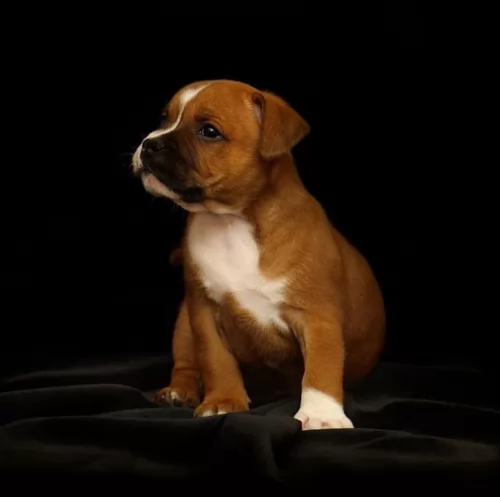 The Staffordshire is a muscular, stocky and unusually strong breed, small to medium size in height and build. They have broad, powerful chests, wide set, strong legs, strong shoulders, broad head with a fairly short muzzle. Their ears are not cropped but they are short and fold over. The coat is stiff, close and short and the tail is medium and carried low. Most Staffies are brown, but they can be red, brindle with white, fawn, black, white or blue.
The Staffordshire is a muscular, stocky and unusually strong breed, small to medium size in height and build. They have broad, powerful chests, wide set, strong legs, strong shoulders, broad head with a fairly short muzzle. Their ears are not cropped but they are short and fold over. The coat is stiff, close and short and the tail is medium and carried low. Most Staffies are brown, but they can be red, brindle with white, fawn, black, white or blue.
 The Porcelaine is a working, hunting dog but he is more than willing to become a companion animal, being loving and loyal to his human family.
The Porcelaine is a working, hunting dog but he is more than willing to become a companion animal, being loving and loyal to his human family.
He is a balanced, kind natured dog and can get on well with children and with pets in the home.
He enjoys his human family, and typical of hounds he is friendly, energetic and amusing. Bring this beautiful white dog into your home and start a wonderful, long, loving friendship with him.
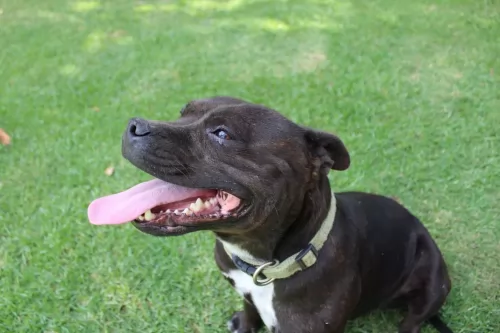 1.Children friendliness The breed adores children but care should still be taken because they are so strong and their jaws are so powerful.
1.Children friendliness The breed adores children but care should still be taken because they are so strong and their jaws are so powerful.
2.Special talents they adore children and they one of the most powerful jaws among canines.
 The Porcelaine has so many good features, and good health is one. He is described as a truly healthy breed that can easily reach up to 14 years of age with good care.
The Porcelaine has so many good features, and good health is one. He is described as a truly healthy breed that can easily reach up to 14 years of age with good care.
As a Porcelaine owner, look out for some of the more common heath conditions such as cancer, bloat and skin infections.
A working, hunting type dog such as the Porcelaine can be devastated with hip dysplasia. It’s a disease that can be genetically passed on and if your dog has it,it should be spayed or neutered. The condition, where your pet becomes more and more reluctant to participate in exercise can be painful and debilitating.
There are different treatments available for pain relief and mobility.
The long, floppy ears of the Porcelaine can result in a tendency towards ear infections. Ear infections can be painful and frustrating and you’ll see your dog scratching his ears and shaking his head. The ears may be red inside and there may even be a discharge. Don’t allow your pet to suffer and get him to the vet.
 • Patella luxation otherwise known as a slipped kneecap- can cause pain and some lameness.
• Patella luxation otherwise known as a slipped kneecap- can cause pain and some lameness.
• Skin allergies and even a tendency toward Mange which is chronic in some forms and fatal in others.
• Like most active dogs their size, they are susceptible to bloat which can be fatal if not treated immediately.
 Porcelaines have a very high activity level and require lots of exercise - ball games and walks. Because of this, they aren't recommended for people living in small homes in the city. He will ideally suit life on a big property.
Porcelaines have a very high activity level and require lots of exercise - ball games and walks. Because of this, they aren't recommended for people living in small homes in the city. He will ideally suit life on a big property.
The Porcelaine Dog is a single coated dog with very short hair and is looked upon as being pretty low maintenance.
Apart from brushing him twice a week, to keep the coat shiny and healthy, wipe him down with a hound mitt to get rid of loose hairs and to remove dust.
Because of the long, floppy ears, clean the insides very gently to avoid dirt, moisture and wax buildup. There are veterinarian-recommended ear cleansers, but if you don’t like the idea of doing it yourself, the vet or groomer will do it for you when you take him to have his nails clipped.
Your beautiful Porcelaine dog needs the very best food there is so as to ensure he remains the healthy, shiny, lean specimen he is.
He can live a long, healthy life if you choose quality dog food packed with the right mix of vitamins and minerals. If you buy commercially manufactured dog food for him, it needs to be the high quality ones to ensure its properly formulated.
Your Porcelaine, like any other dog, wants consistency and simplicity. Home-made food is always an excellent choice for your pet’s diet. Boiled chicken, brown rice or pasta and spinach, sweet potatoes and carrots can be very healthy for him.
Chop it up and add it into the dry kibble a couple of times a week. Its providing him with some variety from the dry kibble and gives him a tasty treat.
Some raw meat added in occasionally will also ensure his coat and eyes remain bright and vibrant. Always make sure he has access to fresh, cool water.
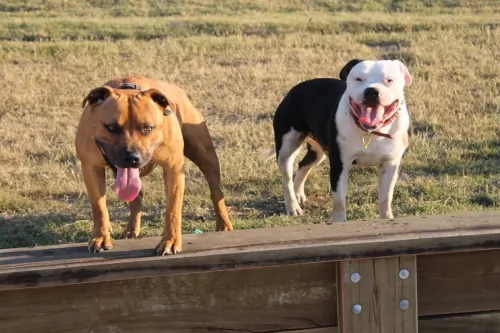 1.Feeding the puppy Don’t over feed as he grows fast. Feed a high quality dog food for medium size puppies. Feed 1-2 and a quarter cups in 3-4 meals per day.
1.Feeding the puppy Don’t over feed as he grows fast. Feed a high quality dog food for medium size puppies. Feed 1-2 and a quarter cups in 3-4 meals per day.
2.Feeding the adult Don’t exercise right before or after eating due to potential for bloat. Feed 1-2 times a day a high quality medium breed dog food.
4. Games and Exercises They are terriers after all and they dig. Need a fairly large yard with a strong fence. They love to play ball, frisbee and can excel at cart pulling.